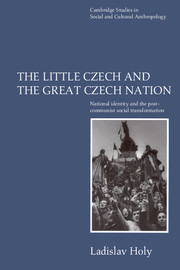 The Little Czech and the Great Czech Nation
The Little Czech and the Great Czech Nation Published online by Cambridge University Press: 05 June 2012
The discourse surrounding the beginning of the economic transformation in post-communist Czechoslovakia explicitly contrasted the socialist planned economy with the market economy. The opposition between a natural process and human design which it articulated was explicitly posed by Prime Minister Václav Klaus in a television interview in October 1992 in which he objected to the interviewer's formulation ‘instituting a market economy’ and his question of when the process would be completed. In Klaus's view, a market economy was not something that could be instituted by human beings and certainly not something that could be declared as having been successfully instituted from a specific date. Rather it was a ‘spontaneous process’, and all people could do was to create the legislative conditions that would allow it to take place. The opposition between the naturally constituted or given and the artificially created through deliberate human design is an opposition that not only articulates and gives form to economic discourse but is regularly invoked and pervasive in many other discourses and in that sense can be seen as an important dichotomy of Czech culture.
Like any other culture, Czech culture is not isolated from others. Czechs constantly compare themselves with others, and Czech culture accepts new ideas and values from other cultures. This process is, however, highly selective, and it is again the opposition between the naturally constituted and the consciously created that provides the gauge for the acceptance or rejection of new trends.
To save this book to your Kindle, first ensure no-reply@cambridge.org is added to your Approved Personal Document E-mail List under your Personal Document Settings on the Manage Your Content and Devices page of your Amazon account. Then enter the ‘name’ part of your Kindle email address below. Find out more about saving to your Kindle.
Note you can select to save to either the @free.kindle.com or @kindle.com variations. ‘@free.kindle.com’ emails are free but can only be saved to your device when it is connected to wi-fi. ‘@kindle.com’ emails can be delivered even when you are not connected to wi-fi, but note that service fees apply.
Find out more about the Kindle Personal Document Service.
To save content items to your account, please confirm that you agree to abide by our usage policies. If this is the first time you use this feature, you will be asked to authorise Cambridge Core to connect with your account. Find out more about saving content to Dropbox.
To save content items to your account, please confirm that you agree to abide by our usage policies. If this is the first time you use this feature, you will be asked to authorise Cambridge Core to connect with your account. Find out more about saving content to Google Drive.